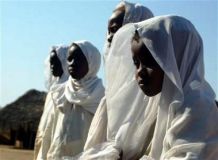South Sudanese bemoan lack of peace dividend
Nov 21, 2005 (KURMUK, Ethiopia/Sudan border) — Mary Nyamom lies by her half-dead child in the bare hospital in Kurmuk on the Sudan-Ethiopia border, declaring she will return to the refugee camp she lived in before because it had better health services.
 Nyamom trekked back across the mine-strewn border to her native Sudan, hoping to find her soldier husband after years of living as a refugee in neighbouring Ethiopia, where more than 100,000 Sudanese fled the bitter southern civil war.
Nyamom trekked back across the mine-strewn border to her native Sudan, hoping to find her soldier husband after years of living as a refugee in neighbouring Ethiopia, where more than 100,000 Sudanese fled the bitter southern civil war.
But almost a year after the war ended in January, the people of the south bemoan the slow implementation of the armistice agreement and the lack of a peace dividend after years of suffering in a conflict which claimed two million lives.
“I’m going straight back to the camp in Ethiopia,” Nyamom said. But she would have to wait until she and her son were cured of the severe bouts of malaria which claim many victims in the leafy, mosquito-ridden area.
“Kurmuk hospital with 24 hour emergency unit,” said a new sign written in English. But as the run-down buildings with paint peeling from the walls had no electricity, patients lay in beds outside in the courtyard to find shade from the hot sun under the branches of huge trees.
“The peace did not begin with the deal, rather we are in a period of cold war,” said Santino Samar, a Kurmuk resident. “If this was peace, the roads would have opened up, the water would flow and we would have education and health — but instead we have nothing.”
UGLY SCENES
Picturesque Kurmuk, population 60,000, saw ugly scenes of fighting as it changed hands several times during two decades years of conflict between the Khartoum-based government and the former rebel Sudan People’s Liberation Army (SPLA).
In the shadow of lush tree-covered mountains, children played in the burnt-out wrecks of vehicles kept as trophies by SPLA fighters who eventually conquered and held the town in 1997.
Kurmuk residents complain that the United Nations, despite its plan to spend almost $2 billion on aid to Sudan in 2005, has done nothing to help them.
“We have suffered years of war and we want roads, health and education,” said Azza Mohamed Youssef. “The United Nations and the government have not done anything for peace.”
U.N. workers said Kurmuk had been inaccessible during the rainy season because the dirt roads became river beds.
Kurmuk is in Southern Blue Nile, one of three areas fiercely disputed between the government and the SPLA during the peace talks. The state will remain part of the north, but will be jointly administered by the two parties.
The local population are under strain after years of war and must also cope with 12,000 refugees who have returned home since the peace agreement, living with relatives and quickly exhausting their meagre resources.
In January organised returns with the U.N. refugee agency will begin, but locals said they expected disputes as people reclaim their lands which are likely being farmed by newcomers who arrived after the owners fled during the fighting.
Nyamom said she’d come back with the United Nations then. “But right now I cannot stay here,” she said.
(Reuters)
